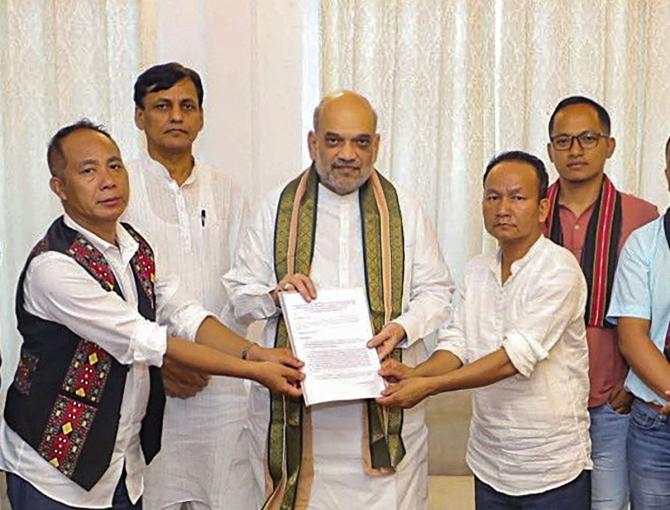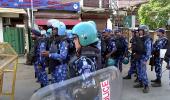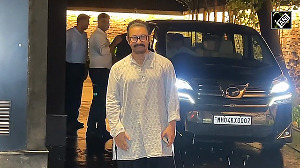There are three things you never do in a small North East state: Undermine local leaders, divide and rule, push homogenisation, asserts Shekhar Gupta.

The most important development in the ongoing crisis in Manipur is that Union Home Minister Amit Shah has himself gone there to try and douse the fire.
It isn't just one of those flying visits to an outpost distant from New Delhi.
Land, speak to the press, hold two meetings with the state government and officials, meet some delegations and head back home to sleep at night, the usual. He has stayed there for four days.
It isn't just the longest time he has spent in a troubled state in his years as home minister; it is probably the longest any home minister has spent camping in the capital of a disturbed state.
This is the first and most important public acknowledgement of the fact that the Centre is putting the crisis in this so far out-of-sight/out-of-mind zone at the top of its concerns.
It's a good thing, therefore, that the home minister has invested so much time and political capital in Manipur.
The time in Manipur would have enabled him to see the realities of a complex state beyond its electoral politics.
In the past five decades since the region was reorganised and the new states came into being (in the 1970s), one pattern has been consistent: That whichever party rules at the Centre has generally been able to own, acquire, co-opt, or even subvert and substitute local power elites and either form its own government or put loyalists in power.
The Congress did it in its time, and even the Janata Party did some of it in its relatively short tenure after it come to power in 1977.
The BJP, therefore, has done nothing new here. Except, as with everything else, this BJP prefers scale.
It is heady, too, if the party or its tiny, microscopic-on-the-national-scale allies rule the North East.
It rarely happened even in the Indira or Rajiv era. In Tripura, for example, the Left continued to beat Indira Gandhi's Congress.
Her son Rajiv followed a different tack, signing peace accords with the Mizo separatist insurgents and Assam movement leaders and conceding power to them in the elections that followed.
The political map of the region looks dramatically different now. The BJP's sway here has no precedent in history.
This also brings in problems in its wake -- as Mr Shah would have seen on his visit.
If he checked the local newspapers while he was in Imphal, he might have flipped the pages of the leading English language newspaper, The Sangai Express, on the morning of June 2.
It had a full front-page government advertisement, as is the routine all over the country now.
This one hailed the visit and 'peacekeeping initiatives of Amit Shahji', listing at the top condolences for all the bereaved families from Prime Minister Narendra Modi, and the steps taken to restore normalcy during his visit from '29th May to 1st June'.

Once you go beyond the front page, you'd see the paper's editorial saying exactly the opposite.
I'd repeat a couple of sentences from this editorial, which displays the kind of courage missing from much of our more powerful media lately.
It begins: 'Nearly one month down the line and there is nothing to suggest that Manipur is on the road to recovery.'
It then goes on to remind us that 'gunmen continue to rule the Imphal-Dimapur highway checking private vehicles in case they are carrying any 'enemy' (Meiteis)'.
The editorial isn't partisan on ethnic lines.
It's a fair, desperate cry from the heart.
While it talks of the targeting of the Meiteis and their flight from tribal districts, it also notes how the Kukis have been violently driven out of the Imphal Valley.
'Imphal and the other Valley-based district headquarters are today practically free of the Kukis and despite this tragic reality either side does not seem to have softened their stance'.

If in its nine years in power little Manipur has emerged as the BJP's most formidable internal security challenge, it is to do with the complex politics and demographics, especially of the smaller North Eastern states (besides Assam), which have never been easy to govern from New Delhi.
If you check out the history year-on-year, these are impossible to govern from the Centre.
Over the years, they've also proven impossible to govern from Shillong (the original capital of the larger Assam) or now Guwahati.
Each state has a mind, politics, and demographics of its own.
The one party, one slogan, one idea, one leadership stuff does not work here.
At least, not as it might work in Madhya Pradesh, Gujarat or even Assam.
The tribal elites have forever resented New Delhi's heavy hand.
Now they also have to deal with a regional commissar in Himanta Biswa Sarma.
They won't say so in public, but if they speak to you in confidence, they will remind you -- somewhat wistfully -- that one big reason they wanted separate states was to get out of Assam's control.
The BJP has now brought them back exactly to that situation.
You might want to take note of the fact that the one BJP leader missing in action in Manipur was Himanta Biswa Sarma (until last week). Never mind that he's seen as the leader of the entire region and formally he leads the North-East Democratic Alliance. It's a grouping of all chief ministers, either from the BJP or parties aligned to it.
There are multiple reasons that the tiny states of the North East confound the 'mainland' leaders, political, administrative or from the intelligence agencies.
The first is the mindset of autonomy. Maybe the distance over so many decades and the distinctness of identity complicate this.
That's why so many insurgencies began here, and some still smoulder.
The most significant one, the National Socialist Council of Nagaland (NSCN), for example, is led and mostly 'peopled' by members of the Tangkhul tribe who have kept the Modi government waiting for a peace settlement for nine years.
Its leader, T Muivah, too is a Tangkhul.
Now think about the fact that the Tangkhuls are a tribe that lives not in Nagaland, but in Manipur.
And they are no more than 600,000 people, if that many.
And at this point in Manipur, they aren't even fighting on either side.
They just help put the challenges of dealing with the region's diversity in perspective.
I might go a step forward and qualify this: The region's armed diversity in perspective.
If these 600,000 do not bother about anybody's orders from New Delhi, why would a million Kukis?
Or tomorrow, who knows, their Mizo cousins next door?
It shows how ignorant and oblivious we are of the realities in this complex region that we haven't seen the national media reach out yet and report on the growing anxieties within the Zoramthanga-led Mizo National Front (MNF) government, which is facing elections later this year.
The Mizos and Kukis have a shared ethnic identity, and if the anger from Manipur flows across the border into Mizoram, it will make life that much tougher for the MNF, a BJP ally as an NDA member.

There are three things you never want to do in these smaller North Eastern states. One, tell the people that their chief minister is a figurehead and the real bosses live elsewhere.
Second, play one ethnicity against the other to conjure up a majority in your favour.
And third, never suggest a homogenisation or subsuming of distinct ethnic, linguistic and cultural identities into a rounded national one.
Over the decades, as separatism has declined, these states have gently grown into a calmer, less chest-thumping, relaxed, even serendipitous idea of Indian nationalism.
Any effort to fast-forward that causes an immune reaction.
Since our focus right now is Manipur, just remember how central Manipur is to the idea of India. The first time 'independent' India's flag was unfurled by an advancing nationalist army was in Manipur: Netaji Subhas Chandra Bose, Mairang, April 14, 1944, just about 45 km from Imphal.
It was then the gateway to Dilli. Now it looks up to the same Dilli for better understanding, and much empathy.
By Special Arrangement with The Print
Feature Presentation: Aslam Hunani/Rediff.com












